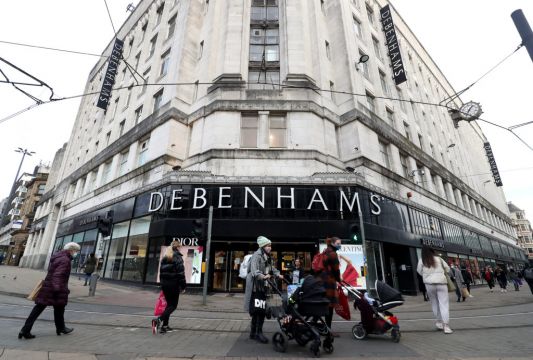Online fashion retailer Boohoo has bought the Debenhams brand and website for £55 million (€62 million0 in a deal that will see the eponymous department store name survive, but the company’s remaining 118 stores close for good.
The deal will see Debenhams products sold by Boohoo from early next year, allowing enough time for liquidators to continue closing the retailer’s sites once they are allowed to reopen after Covid-19 lockdown restrictions are lifted.
But with stores closing across the 242-year-old brand, it is unlikely many of the remaining 12,000 jobs will be saved.
Debenhams had already announced significant job losses and the permanent closure of six stores, including its flagship outlet on London’s Oxford Street.
Boohoo said the deal represents a “fantastic opportunity” to target new customers and launch into the beauty, sports and homewares market for the first time.
The company highlighted that Debenhams has six million beauty shoppers and 1.4 million Beauty Club members.
Boohoo said: “The group intends to rebuild and relaunch the Debenhams platform, helping further the group’s stated ambition to lead the fashion ecommerce market, and grow into new categories including beauty, sport and homeware.”
Boohoo shareholders appeared to welcome the deal, with shares up 4% in early trading on Monday.

However, Shore Capital retail analyst Greg Lawless warned that an online-only operation could hit Debenhams’ beauty sales.
He said: “The big question in beauty is whether the big beauty brands – Clinique and Channel – will remain with Boohoo longer term.
“The Debenhams number one position in premium beauty was predicated on counter sales, which will not form part of this acquisition.”
In hints that it intends to take on the might of Amazon, Boohoo said it would create the UK’s largest marketplace across fashion, beauty, sport and homeware – expanding the range of products sold via Debenhams marketplace by maintaining current third-party relationships and expanding further.
Debenhams’ own fashion brands will also be absorbed into Boohoo’s current portfolio and sold via the Debenhams website.
Boohoo chief executive John Lyttle said: “The acquisition of the Debenhams brand is an important development for the group, as we seek to capture incremental growth opportunities arising from the accelerating shift to online retail.”
Founder and executive chairman Mahmud Kamani said: “Our acquisition of the Debenhams brand is strategically significant as it represents a huge step which accelerates our ambition to be a leader, not just in fashion e-commerce, but in new categories including beauty, sport and homeware.”
Boohoo has previously bought a number of well-known high street brands out of administration, turning them into online-only operations, including Oasis, Coast and Karen Millen.
Geoff Rowley, joint administrator for Debenhams and partner of FRP Advisory, said: “We are pleased to have secured the future for this great brand, and to have created the opportunity for a new Debenhams-branded business to emerge in a different shape beyond the pandemic.
“I expect that the agreement with Boohoo may provide some job opportunities, but we regret that this outcome does not safeguard the jobs of Debenhams’ employees beyond the winding-down period.”
Irish operation
Debenham’s Irish operation went into liquidation last April and around 1,000 workers who lost their jobs have been in dispute over settlement proposals put forward by the Labour Court.
The state has already paid out €13 million to fund statutory redundancy and payments and other employment rights entitlements, but Mandate, the union representing the workers, had sought up to €10 million more to deliver the four weeks per year of service enhanced entitlements provided for under a 2016 collective agreement.
Since the liquidation, workers have maintained pickets on the 11 Debenhams Ireland stores preventing liquidators KPMG from removing stock.
They argue that the proceeds of the stock should be ringfenced to fund the enhanced redundancy terms.







